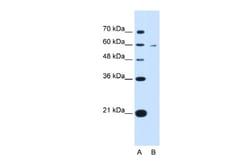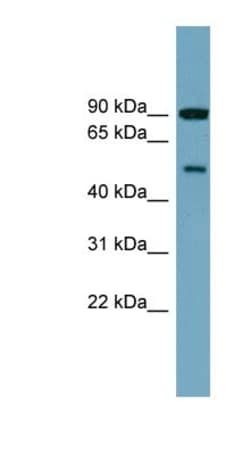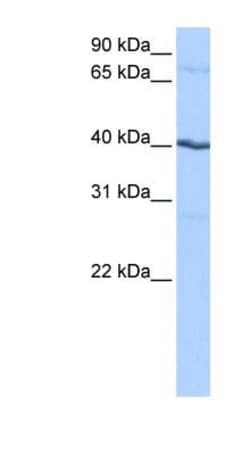Kynureninase Antibody, Novus Biologicals™
Manufacturer: Novus Biologicals
Select a Size
| Pack Size | SKU | Availability | Price |
|---|---|---|---|
| Each of 1 | NBP156545-Each-of-1 | In Stock | ₹ 44,455.50 |
NBP156545 - Each of 1
In Stock
Quantity
1
Base Price: ₹ 44,455.50
GST (18%): ₹ 8,001.99
Total Price: ₹ 52,457.49
Antigen
Kynureninase
Classification
Polyclonal
Conjugate
Unconjugated
Formulation
PBS, 2% Sucrose with 0.09% Sodium Azide
Gene Alias
EC 3.7.1.3, kynureninase, kynureninase (L-kynurenine hydrolase), L-kynurenine hydrolase
Host Species
Rabbit
Molecular Weight of Antigen
52 kDa
Quantity
100 μL
Primary or Secondary
Primary
Test Specificity
Expected identity based on immunogen sequence: Chicken: 78%.
Target Species
Human, Mouse, Rat, Bovine, Canine, Equine, Guinea Pig, Rabbit, Yeast
Isotype
IgG
Applications
Western Blot, Immunohistochemistry, Immunohistochemistry (Paraffin)
Concentration
0.5 mg/ml
Dilution
Western Blot 1.0 ug/ml, Immunohistochemistry 1:10-1:500, Immunohistochemistry-Paraffin 1:10-1:500
Gene Accession No.
Q16719
Gene Symbols
KYNU
Immunogen
Synthetic peptides corresponding to KYNU(kynureninase (L-kynurenine hydrolase)) The peptide sequence was selected from the C terminal of KYNU. Peptide sequence LAHAVGNVELYLHDWGVDFACWCSYKYLNAGAGGIAGAFIHEKHAHTIKP.
Purification Method
Affinity purified
Regulatory Status
RUO
Gene ID (Entrez)
8942
Reconstitution
Centrifuge the vial of lyoph antibody at 12,000 x g for 20 seconds. Add 50μL of distilled water. Vortex followed by centrifuge again to pellet the solution.Final concentration is 1mg/mL in PBS buffer.
Content And Storage
Store at 4°C short term. Aliquot and store at -20°C long term. Avoid freeze-thaw cycles.
Description
- Description Kynureninase Polyclonal specifically detects Kynureninase in Human samples
- It is validated for Western Blot, Immunohistochemistry, Immunohistochemistry-Paraffin.



